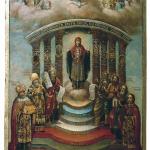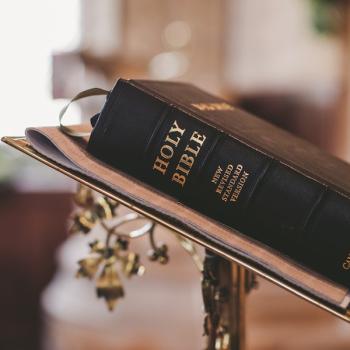Here, we can also see a connection to St. Ignatius’ ideas about the discernment of spirits:
Ignatius believed that these interior movements were caused by “good spirits” and “evil spirits.” We want to follow the action of a good spirit and reject the action of an evil spirit. Discernment of spirits is a way to understand God’s will or desire for us in our life.
Talk of good and evil spirits may seem foreign to us. Psychology gives us other names for what Ignatius called good and evil spirits. Yet Ignatius’s language is useful because it recognizes the reality of evil. Evil is both greater than we are and part of who we are. Our hearts are divided between good and evil impulses. To call these “spirits” simply recognizes the spiritual dimension of this inner struggle. (IgnatianSpirituality.com)
Practically, this could mean all manner of things: practicing hospitality and charity, standing up in justice for the poor and marginalized, righteous rebuke of others in a spirit of humility, prayer and meditation, etc. But the primary point is that, when Silesius speaks of God’s wrathfulness as a fairy tale, he does not mean that we cannot call God wrathful. What he means is that what we call the wrath of God is most often our acquiescing to the ways of the world and failing to guard ourselves. God is not some angry sky being. He drives home the point in this poem:
I say it speeds thee not
That Christ rose from the grave,
So long as thou art still
To death and sin a slave.
(Angelus Silesius)
Hell—the ultimate punishment in some sense, the ultimate display of God’s wrath—is thus not necessarily some place of eternal torment as we might imagine from Dante. Rather, it could be construed as separation from God of the sort that Dives expresses in the Gospels. Fr. John Romanides (whose anti-Western stance, I should make clear, I do not approve of) has written on this conception of Hell:
Paradise and Hell do not exist from the point of view of God, but from the point of view of human beings. God will love everyone equally. He will send His grace to all, in the same way as He will send His grace to all, in the same way as He “makes his sun rise on the evil and on the good, and sends rain on the just and on the unjust” (Saint Matthew 5:45). But everyone will not accept God’s grace in the same way. Some will see God as Light and other as fire. The same will happen as with Holy Communion. For those who prepare themselves appropriately, Holy Communion is “for eternal life”, but for those who have “not been purified, Holy Communion is for judgment and condemnation…” (John Romanides)
In other words, many like Silesius have seen Hell as a state of rejection of God’s grace, which is always offered, a sort of absence expressed as pure presence. Those in Hell cannot see God’s love for what it is and thus reject it. God’s wrath is thus identical with His love.
I do not, however, mean to imply that all bad things that happen are the fault of the people who experience those bad things. No, no, not at all! The nature of evil in the world is terribly complex. It is not that case that one sins and thus receives punishment in some strange mathematical way. Many have written on the myriad ways in which culpability is reduced by conditions ranging from psychological issues to social circumstances. Sin, as Silesius presents it, makes it harder to live a Christian life, but doesn’t mean at all that God abuses you.
I simply mean to point out that Silesius offers us a way to think about the struggle that is Christianity, and how that struggles relates to a God who is both merciful and wrathful, loving and vengeful.
Funnily enough, my use of a Western mystic implies that Romanides is wrong, that this tradition did exist in the West just as it did in the East. But that is, by and large, besides the point. What thinking with Silesius on this topic does is two things: for one, we are reminded that what seems paradox is not always so. Second, we are given an opportunity to reflect on God’s grace, on what is available to us and how we ought to make use of it. We are, in this sense, called to repentance—a fact that I can only imagine every Christian thinker from the Desert Hermits to Aquinas, Silesius, and Romanides would agree on.













